El Salvador: “Reality” Check
BY HANNAH COLEY | June 11, 2014
“On the one hand, things are far worse than they seem. On the other, they are far better. Sin abounds- but grace abounds even more. Whatever terrible things we have done, however cruel the world may be, healing and new beginnings are possible. We are not condemned to live behind cinder block and razor wire. If deep in our hearts we believe that justice will triumph someday, that is because it will. We are not alone in the universe. Something- Some One- is at work, transforming reality.” -Dean Brackley, S.J.
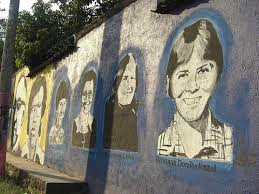 As an alumnus of Walsh Jesuit High School in Cleveland, Oh and as a current junior at Loyola University Chicago, I have had many an encounter with the term “reality.” Quite recently, I had the completely transformative opportunity of traveling with a group of Loyola and Jesuit faculty members on an alternative break immersion to El Salvador, in commemoration of the 25th Anniversary of the Jesuit and lay martyrs. An incredibly inspirational Jesuit who traveled with us from campus posed the challenging question of “what is reality?” What sort of “reality” was Dean Brackley referring? Does the Ignatian family so often refer?
As an alumnus of Walsh Jesuit High School in Cleveland, Oh and as a current junior at Loyola University Chicago, I have had many an encounter with the term “reality.” Quite recently, I had the completely transformative opportunity of traveling with a group of Loyola and Jesuit faculty members on an alternative break immersion to El Salvador, in commemoration of the 25th Anniversary of the Jesuit and lay martyrs. An incredibly inspirational Jesuit who traveled with us from campus posed the challenging question of “what is reality?” What sort of “reality” was Dean Brackley referring? Does the Ignatian family so often refer?
Realized Discovery of the Presence of God
Quite simply…or quite complexly, this so-called “reality” is the realized discovery of the presence of God in all things. But what is finding God in all things? It is the recognition, that despite setbacks and failure, a world soaked with freedom, love, community, and humility is indeed possible, which makes me hopeful. I learned in the hearts and beauty of the Salvadoran people and mountains that this sense of hope is inherently part of the entire creation process.
While in El Salvador, I traveled to the exact site in La Libertad, El Salvador where Jean Donovan, an American lay missionary, was raped and murdered, alongside Sr. Dorothy Kazel, Sr. Ita Ford, and Sr. Maura Clarke, by a Salvadoran military death squad while volunteering during the Salvadoran Civil War. These women have my utmost respect and are great sources of inspiration as I, myself, attempt to make a small dent in the realm of seeking and implementing social justice in this vastly mistaken world. These women, four of my greatest inspirations, chose to live lives of discomfort as opposed to ones of material satisfaction and ease. My journey in El Salvador challenged me to question how I, in my faith and spirituality, can live a life of “discomfort”, restlessness, and goodness. How can I live a life that is selflessly and wholly dedicated to my brothers and sisters?
During my visit to El Salvador I spoke with Candelaria, a close friend of Sr. Kazel during the period in which she persistently volunteered in El Salvador during the last years of her young life. We sat and I listened in the chapel that was constructed on the site where the four women were found in a roadside makeshift grave. Candelaria gave me the best advice I could have received, as I am in the process of recognizing and discerning the human crisis of injustice in which our world is so plagued.
She said, “True love is to live a life for and with others. To give yourself is to love. How beautiful it is to give and to love. You must pray to understand, and you must understand in order to live.”
I admire Jean and Dorothy because they dedicated their lives to other human beings and loved in a way that reaffirms the importance and meaning of love and human connection. As human beings, we are programmed to love; we are programmed to be religious to love. It is in the examples of Jean and Dorothy that this HAS to be true.
Kazel’s five step process of worldly discernment was to:
1. See-see the issues of society in relation to the effects it has on the poor and marginalized.
2. Feel-feel the pains of the oppressed by being in solidarity and faith with them.
3. Judge-discern these societal injustices.
4. Act-after judging the issues, look inside yourself to personally bring about the greatest amount of change and goodness, PEACFULLY!!
5. Celebrate-after taking action, return to the poor and oppressed, in solidarity, faith, justice, and goodness.
Exploring the Deepest Sense of our Souls
Through experiences, connections and relationships we endure day to day, we are able to explore the deepest sense of our souls and to find purity and grace. Through these explorations, we are better able to understand and grasp our passions, and to be vulnerable to the people, actions, chances, and places that seize and transform the fire in our hearts and the fire in our souls. All of this helps us to discover what it is that we live for and what it is that we are in love with. In this discovery, we are challenged to seize this love and to then rip it apart, examine it, and allow it to flow into and transform the streams of hatred and injustice. We will face obstacles that challenge the authenticity and reality of this love, but we are called to: hold onto it, strengthen it, and nurture it.
In hope and in observation, Fr. Dean Brackley, S.J. writes:
“Despite setbacks and failings, a different world- of freedom, community, abundant life- is in the making.”
Hannah Coley grew up in Chicago, Illinois but calls the small northeast Ohio town of Cuyahoga Falls home. She graduated from Loyola University Chicago in May of 2016, majoring in Philosophy with a concentration in Social Justice and minoring in Peace Studies and Dance. She served for two years as a Jesuit Volunteer in Punta Gorda, Belize as the Youth Ministry Coordinator for St. Peter Claver Jesuit Parish from 2016-2018.


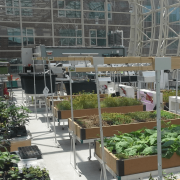


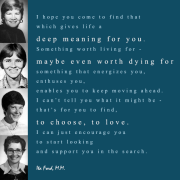
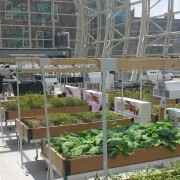
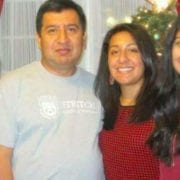



Leave a Reply
Want to join the discussion?Feel free to contribute!